Faculty of Business and Law: M05CLS CISG Role Evaluation Essay
VerifiedAdded on 2022/12/27
|23
|7347
|1
Essay
AI Summary
This essay critically evaluates the role of the United Nations Convention on Contracts for the International Sale of Goods (CISG) in international business. It begins with an introduction to commercial law, differentiating between business and commercial law, and highlighting the significance of the CISG in harmonizing international trade laws. The essay then delves into the specific roles of the CISG, emphasizing its contribution to reducing legal obstacles, fostering international legal consistency, and preventing disputes. It provides a detailed analysis of the CISG's impact on international sales contracts and its comparison with the Uniform Commercial Code (UCC). The paper further explores the background of the CISG, including its origins within the United Nations Commission on International Trade Law (UNCITRAL), its objectives, and its scope, which governs contracts between parties from different states. Finally, the essay examines the impacts and consequences of the CISG, including its influence on international trade, its application in various legal contexts, and its role in facilitating fair rules for international sales contracts. The paper uses examples and case studies, such as Chicago Prime Packers, Inc. v. North am Food Trading Co., to illustrate the practical application of the CISG and its importance in resolving international trade disputes.
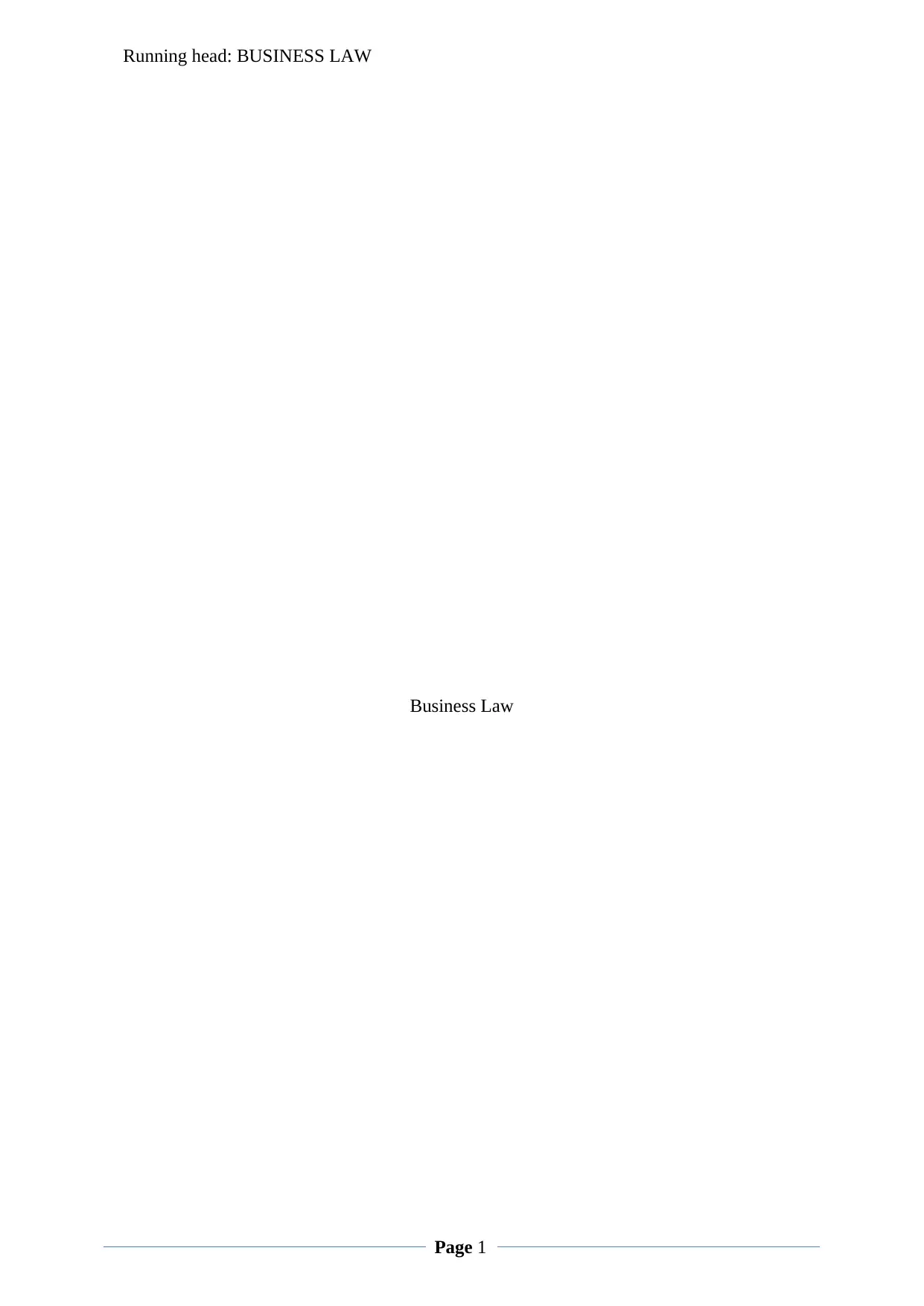
Running head: BUSINESS LAW
Business Law
Page 1
Business Law
Page 1
Paraphrase This Document
Need a fresh take? Get an instant paraphrase of this document with our AI Paraphraser
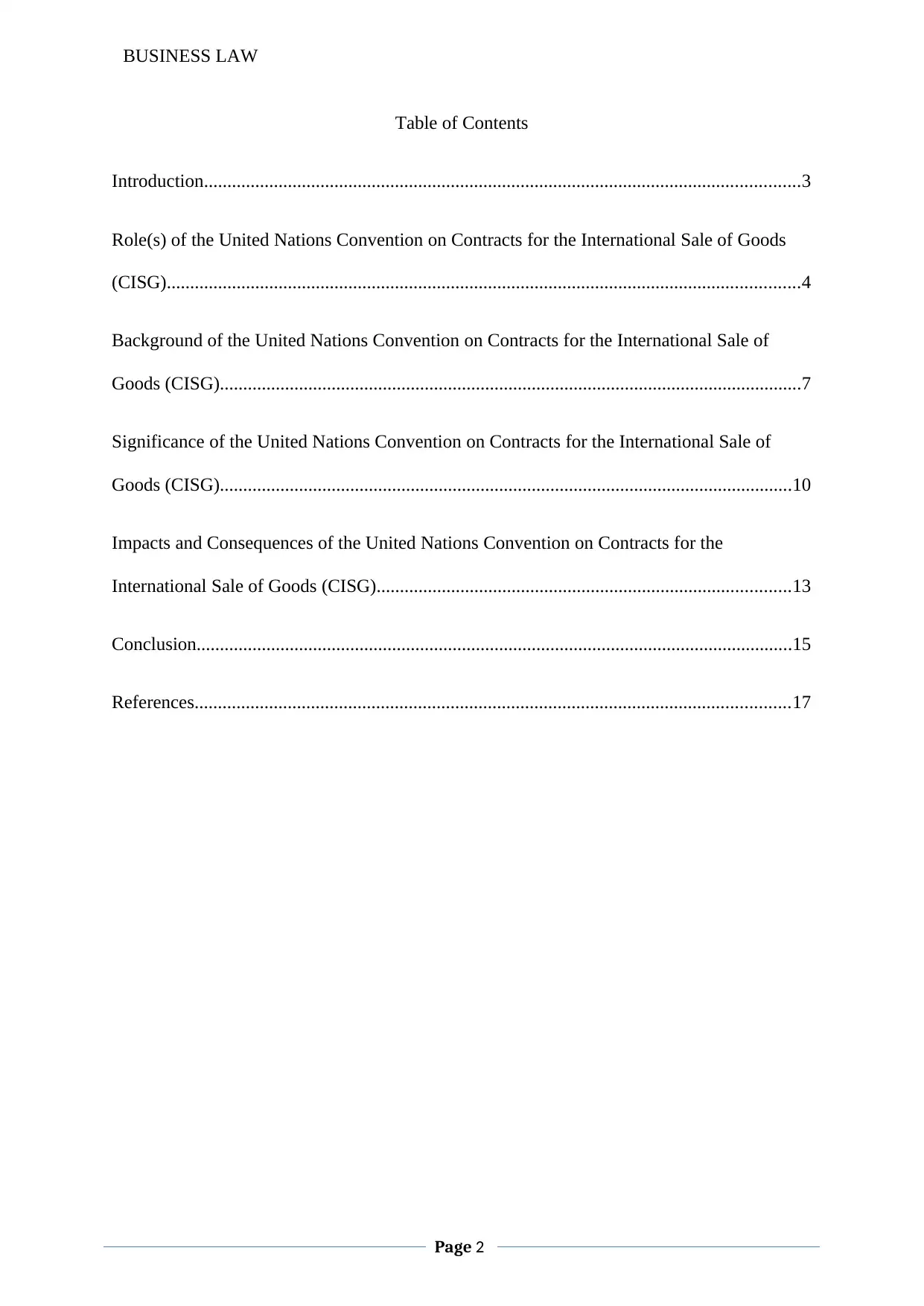
BUSINESS LAW
Table of Contents
Introduction................................................................................................................................3
Role(s) of the United Nations Convention on Contracts for the International Sale of Goods
(CISG)........................................................................................................................................4
Background of the United Nations Convention on Contracts for the International Sale of
Goods (CISG).............................................................................................................................7
Significance of the United Nations Convention on Contracts for the International Sale of
Goods (CISG)...........................................................................................................................10
Impacts and Consequences of the United Nations Convention on Contracts for the
International Sale of Goods (CISG).........................................................................................13
Conclusion................................................................................................................................15
References................................................................................................................................17
Page 2
Table of Contents
Introduction................................................................................................................................3
Role(s) of the United Nations Convention on Contracts for the International Sale of Goods
(CISG)........................................................................................................................................4
Background of the United Nations Convention on Contracts for the International Sale of
Goods (CISG).............................................................................................................................7
Significance of the United Nations Convention on Contracts for the International Sale of
Goods (CISG)...........................................................................................................................10
Impacts and Consequences of the United Nations Convention on Contracts for the
International Sale of Goods (CISG).........................................................................................13
Conclusion................................................................................................................................15
References................................................................................................................................17
Page 2
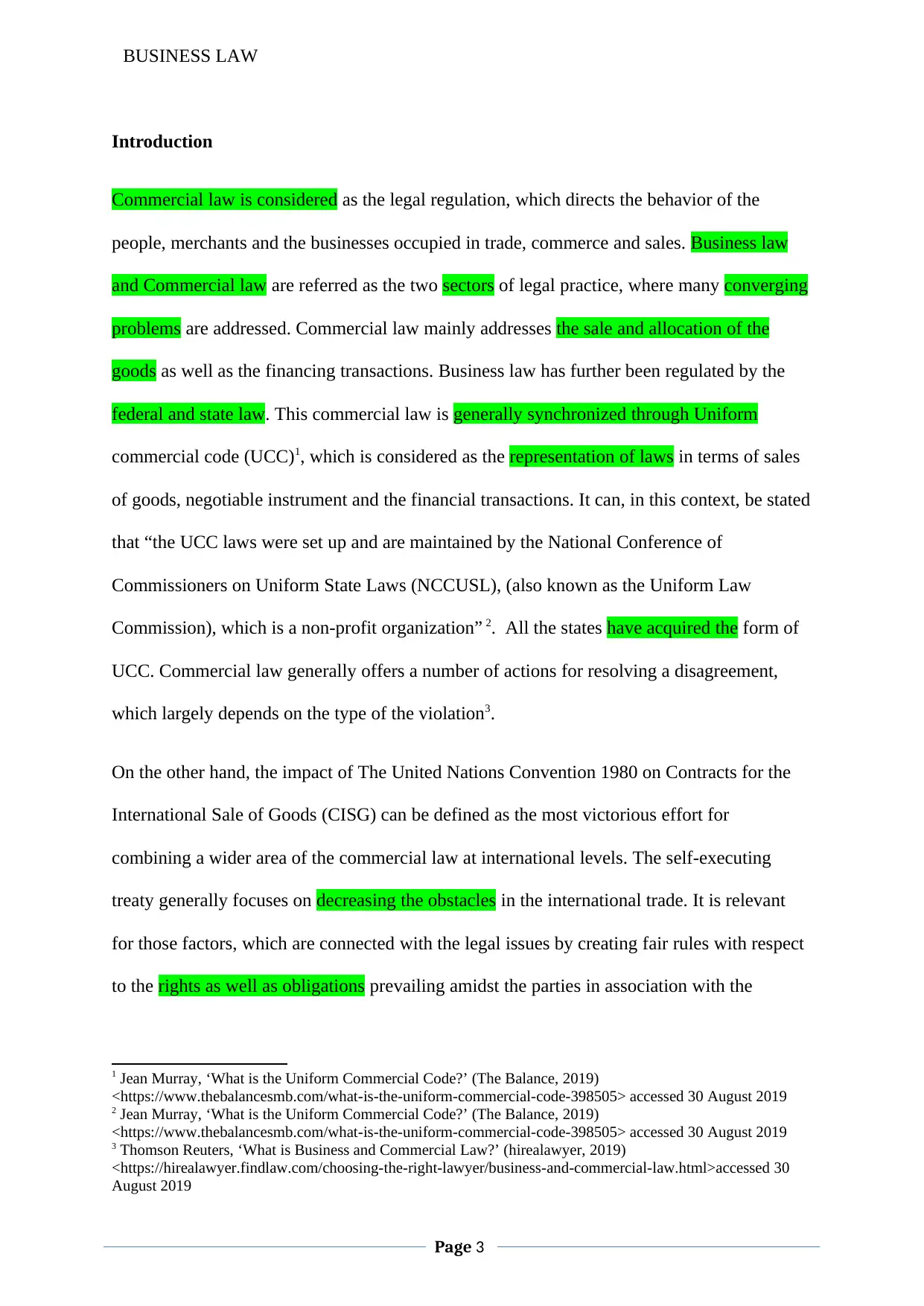
BUSINESS LAW
Introduction
Commercial law is considered as the legal regulation, which directs the behavior of the
people, merchants and the businesses occupied in trade, commerce and sales. Business law
and Commercial law are referred as the two sectors of legal practice, where many converging
problems are addressed. Commercial law mainly addresses the sale and allocation of the
goods as well as the financing transactions. Business law has further been regulated by the
federal and state law. This commercial law is generally synchronized through Uniform
commercial code (UCC)1, which is considered as the representation of laws in terms of sales
of goods, negotiable instrument and the financial transactions. It can, in this context, be stated
that “the UCC laws were set up and are maintained by the National Conference of
Commissioners on Uniform State Laws (NCCUSL), (also known as the Uniform Law
Commission), which is a non-profit organization” 2. All the states have acquired the form of
UCC. Commercial law generally offers a number of actions for resolving a disagreement,
which largely depends on the type of the violation3.
On the other hand, the impact of The United Nations Convention 1980 on Contracts for the
International Sale of Goods (CISG) can be defined as the most victorious effort for
combining a wider area of the commercial law at international levels. The self-executing
treaty generally focuses on decreasing the obstacles in the international trade. It is relevant
for those factors, which are connected with the legal issues by creating fair rules with respect
to the rights as well as obligations prevailing amidst the parties in association with the
1 Jean Murray, ‘What is the Uniform Commercial Code?’ (The Balance, 2019)
<https://www.thebalancesmb.com/what-is-the-uniform-commercial-code-398505> accessed 30 August 2019
2 Jean Murray, ‘What is the Uniform Commercial Code?’ (The Balance, 2019)
<https://www.thebalancesmb.com/what-is-the-uniform-commercial-code-398505> accessed 30 August 2019
3 Thomson Reuters, ‘What is Business and Commercial Law?’ (hirealawyer, 2019)
<https://hirealawyer.findlaw.com/choosing-the-right-lawyer/business-and-commercial-law.html>accessed 30
August 2019
Page 3
Introduction
Commercial law is considered as the legal regulation, which directs the behavior of the
people, merchants and the businesses occupied in trade, commerce and sales. Business law
and Commercial law are referred as the two sectors of legal practice, where many converging
problems are addressed. Commercial law mainly addresses the sale and allocation of the
goods as well as the financing transactions. Business law has further been regulated by the
federal and state law. This commercial law is generally synchronized through Uniform
commercial code (UCC)1, which is considered as the representation of laws in terms of sales
of goods, negotiable instrument and the financial transactions. It can, in this context, be stated
that “the UCC laws were set up and are maintained by the National Conference of
Commissioners on Uniform State Laws (NCCUSL), (also known as the Uniform Law
Commission), which is a non-profit organization” 2. All the states have acquired the form of
UCC. Commercial law generally offers a number of actions for resolving a disagreement,
which largely depends on the type of the violation3.
On the other hand, the impact of The United Nations Convention 1980 on Contracts for the
International Sale of Goods (CISG) can be defined as the most victorious effort for
combining a wider area of the commercial law at international levels. The self-executing
treaty generally focuses on decreasing the obstacles in the international trade. It is relevant
for those factors, which are connected with the legal issues by creating fair rules with respect
to the rights as well as obligations prevailing amidst the parties in association with the
1 Jean Murray, ‘What is the Uniform Commercial Code?’ (The Balance, 2019)
<https://www.thebalancesmb.com/what-is-the-uniform-commercial-code-398505> accessed 30 August 2019
2 Jean Murray, ‘What is the Uniform Commercial Code?’ (The Balance, 2019)
<https://www.thebalancesmb.com/what-is-the-uniform-commercial-code-398505> accessed 30 August 2019
3 Thomson Reuters, ‘What is Business and Commercial Law?’ (hirealawyer, 2019)
<https://hirealawyer.findlaw.com/choosing-the-right-lawyer/business-and-commercial-law.html>accessed 30
August 2019
Page 3
⊘ This is a preview!⊘
Do you want full access?
Subscribe today to unlock all pages.

Trusted by 1+ million students worldwide
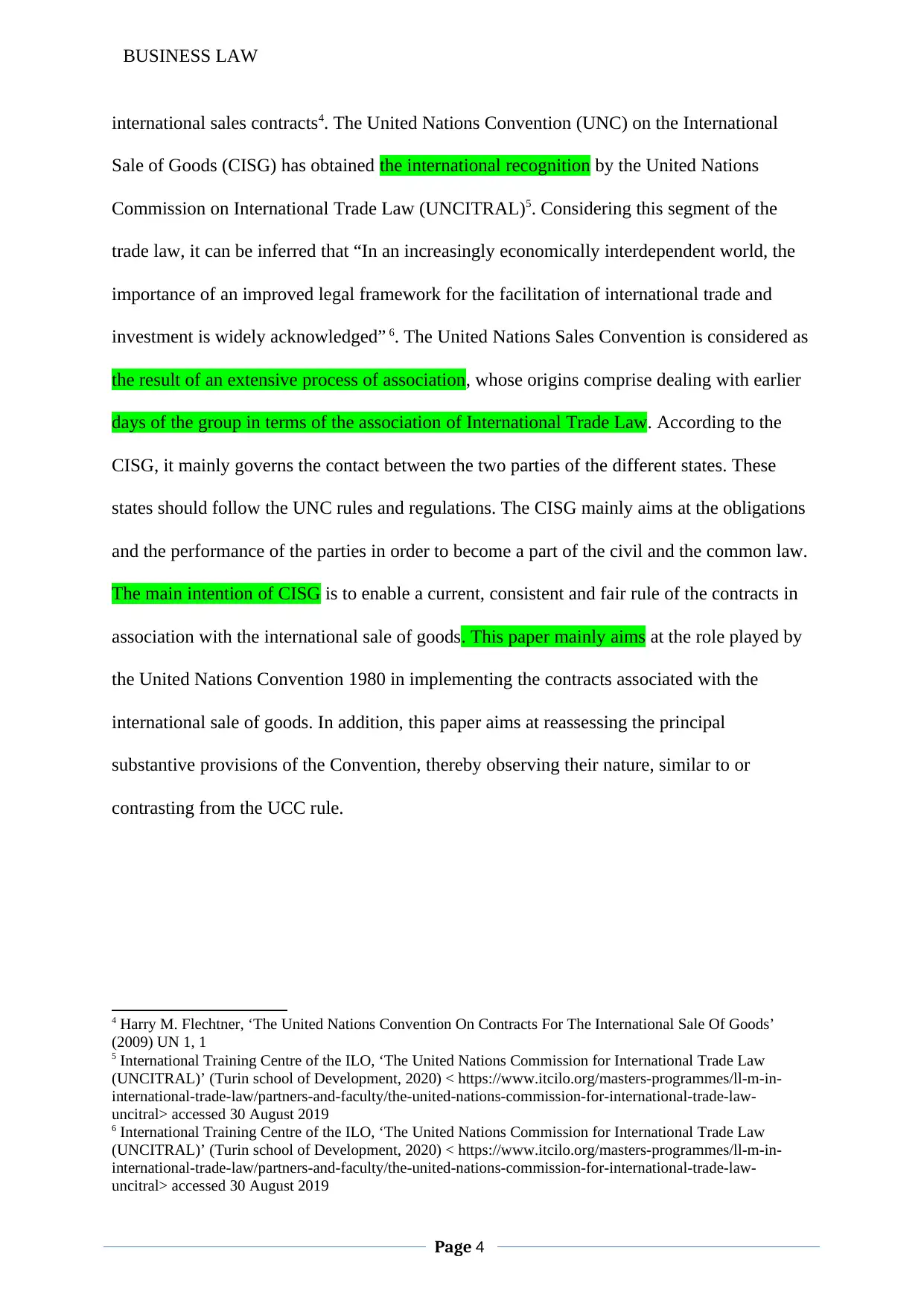
BUSINESS LAW
international sales contracts4. The United Nations Convention (UNC) on the International
Sale of Goods (CISG) has obtained the international recognition by the United Nations
Commission on International Trade Law (UNCITRAL)5. Considering this segment of the
trade law, it can be inferred that “In an increasingly economically interdependent world, the
importance of an improved legal framework for the facilitation of international trade and
investment is widely acknowledged” 6. The United Nations Sales Convention is considered as
the result of an extensive process of association, whose origins comprise dealing with earlier
days of the group in terms of the association of International Trade Law. According to the
CISG, it mainly governs the contact between the two parties of the different states. These
states should follow the UNC rules and regulations. The CISG mainly aims at the obligations
and the performance of the parties in order to become a part of the civil and the common law.
The main intention of CISG is to enable a current, consistent and fair rule of the contracts in
association with the international sale of goods. This paper mainly aims at the role played by
the United Nations Convention 1980 in implementing the contracts associated with the
international sale of goods. In addition, this paper aims at reassessing the principal
substantive provisions of the Convention, thereby observing their nature, similar to or
contrasting from the UCC rule.
4 Harry M. Flechtner, ‘The United Nations Convention On Contracts For The International Sale Of Goods’
(2009) UN 1, 1
5 International Training Centre of the ILO, ‘The United Nations Commission for International Trade Law
(UNCITRAL)’ (Turin school of Development, 2020) < https://www.itcilo.org/masters-programmes/ll-m-in-
international-trade-law/partners-and-faculty/the-united-nations-commission-for-international-trade-law-
uncitral> accessed 30 August 2019
6 International Training Centre of the ILO, ‘The United Nations Commission for International Trade Law
(UNCITRAL)’ (Turin school of Development, 2020) < https://www.itcilo.org/masters-programmes/ll-m-in-
international-trade-law/partners-and-faculty/the-united-nations-commission-for-international-trade-law-
uncitral> accessed 30 August 2019
Page 4
international sales contracts4. The United Nations Convention (UNC) on the International
Sale of Goods (CISG) has obtained the international recognition by the United Nations
Commission on International Trade Law (UNCITRAL)5. Considering this segment of the
trade law, it can be inferred that “In an increasingly economically interdependent world, the
importance of an improved legal framework for the facilitation of international trade and
investment is widely acknowledged” 6. The United Nations Sales Convention is considered as
the result of an extensive process of association, whose origins comprise dealing with earlier
days of the group in terms of the association of International Trade Law. According to the
CISG, it mainly governs the contact between the two parties of the different states. These
states should follow the UNC rules and regulations. The CISG mainly aims at the obligations
and the performance of the parties in order to become a part of the civil and the common law.
The main intention of CISG is to enable a current, consistent and fair rule of the contracts in
association with the international sale of goods. This paper mainly aims at the role played by
the United Nations Convention 1980 in implementing the contracts associated with the
international sale of goods. In addition, this paper aims at reassessing the principal
substantive provisions of the Convention, thereby observing their nature, similar to or
contrasting from the UCC rule.
4 Harry M. Flechtner, ‘The United Nations Convention On Contracts For The International Sale Of Goods’
(2009) UN 1, 1
5 International Training Centre of the ILO, ‘The United Nations Commission for International Trade Law
(UNCITRAL)’ (Turin school of Development, 2020) < https://www.itcilo.org/masters-programmes/ll-m-in-
international-trade-law/partners-and-faculty/the-united-nations-commission-for-international-trade-law-
uncitral> accessed 30 August 2019
6 International Training Centre of the ILO, ‘The United Nations Commission for International Trade Law
(UNCITRAL)’ (Turin school of Development, 2020) < https://www.itcilo.org/masters-programmes/ll-m-in-
international-trade-law/partners-and-faculty/the-united-nations-commission-for-international-trade-law-
uncitral> accessed 30 August 2019
Page 4
Paraphrase This Document
Need a fresh take? Get an instant paraphrase of this document with our AI Paraphraser
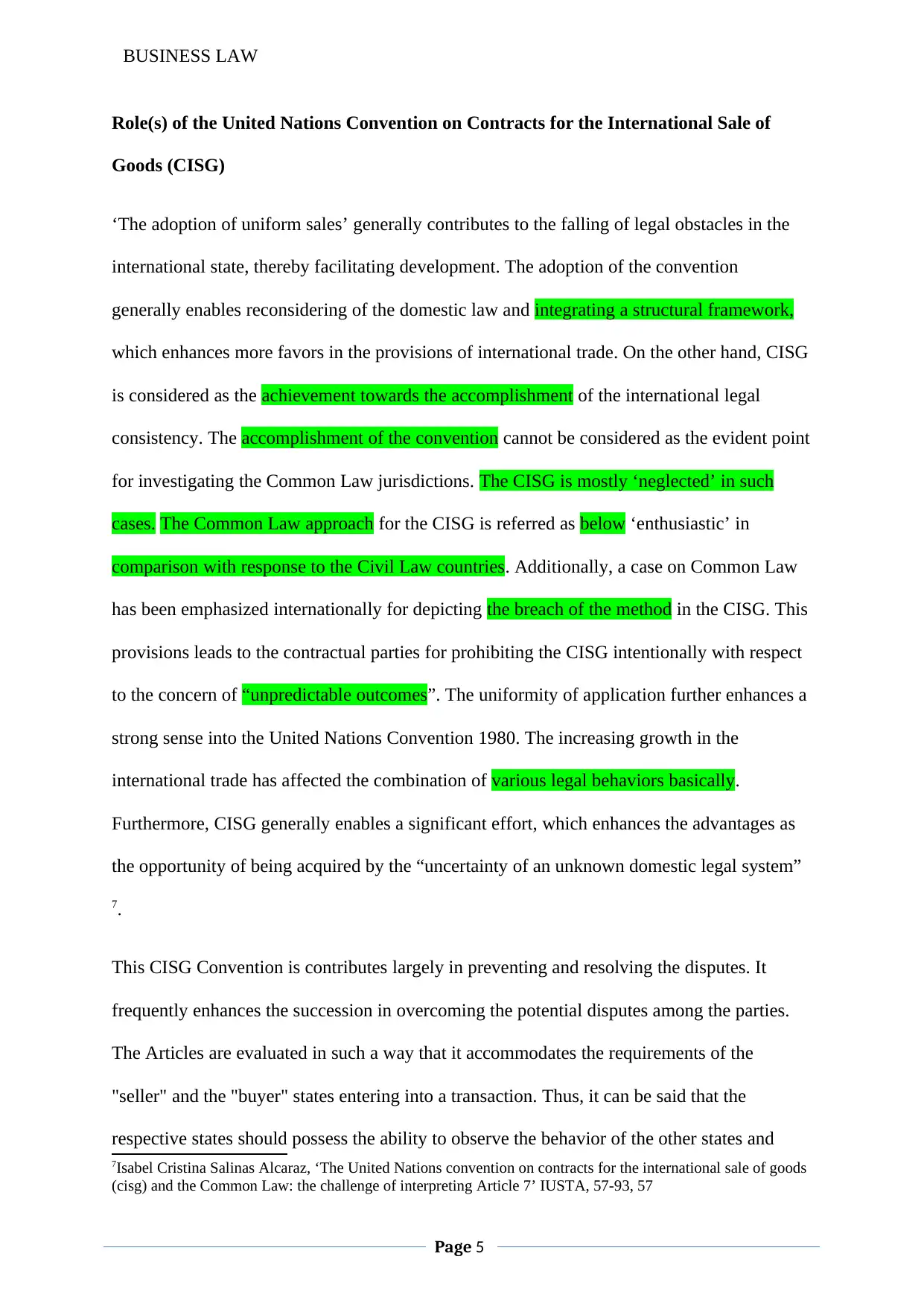
BUSINESS LAW
Role(s) of the United Nations Convention on Contracts for the International Sale of
Goods (CISG)
‘The adoption of uniform sales’ generally contributes to the falling of legal obstacles in the
international state, thereby facilitating development. The adoption of the convention
generally enables reconsidering of the domestic law and integrating a structural framework,
which enhances more favors in the provisions of international trade. On the other hand, CISG
is considered as the achievement towards the accomplishment of the international legal
consistency. The accomplishment of the convention cannot be considered as the evident point
for investigating the Common Law jurisdictions. The CISG is mostly ‘neglected’ in such
cases. The Common Law approach for the CISG is referred as below ‘enthusiastic’ in
comparison with response to the Civil Law countries. Additionally, a case on Common Law
has been emphasized internationally for depicting the breach of the method in the CISG. This
provisions leads to the contractual parties for prohibiting the CISG intentionally with respect
to the concern of “unpredictable outcomes”. The uniformity of application further enhances a
strong sense into the United Nations Convention 1980. The increasing growth in the
international trade has affected the combination of various legal behaviors basically.
Furthermore, CISG generally enables a significant effort, which enhances the advantages as
the opportunity of being acquired by the “uncertainty of an unknown domestic legal system”
7.
This CISG Convention is contributes largely in preventing and resolving the disputes. It
frequently enhances the succession in overcoming the potential disputes among the parties.
The Articles are evaluated in such a way that it accommodates the requirements of the
"seller" and the "buyer" states entering into a transaction. Thus, it can be said that the
respective states should possess the ability to observe the behavior of the other states and
7Isabel Cristina Salinas Alcaraz, ‘The United Nations convention on contracts for the international sale of goods
(cisg) and the Common Law: the challenge of interpreting Article 7’ IUSTA, 57-93, 57
Page 5
Role(s) of the United Nations Convention on Contracts for the International Sale of
Goods (CISG)
‘The adoption of uniform sales’ generally contributes to the falling of legal obstacles in the
international state, thereby facilitating development. The adoption of the convention
generally enables reconsidering of the domestic law and integrating a structural framework,
which enhances more favors in the provisions of international trade. On the other hand, CISG
is considered as the achievement towards the accomplishment of the international legal
consistency. The accomplishment of the convention cannot be considered as the evident point
for investigating the Common Law jurisdictions. The CISG is mostly ‘neglected’ in such
cases. The Common Law approach for the CISG is referred as below ‘enthusiastic’ in
comparison with response to the Civil Law countries. Additionally, a case on Common Law
has been emphasized internationally for depicting the breach of the method in the CISG. This
provisions leads to the contractual parties for prohibiting the CISG intentionally with respect
to the concern of “unpredictable outcomes”. The uniformity of application further enhances a
strong sense into the United Nations Convention 1980. The increasing growth in the
international trade has affected the combination of various legal behaviors basically.
Furthermore, CISG generally enables a significant effort, which enhances the advantages as
the opportunity of being acquired by the “uncertainty of an unknown domestic legal system”
7.
This CISG Convention is contributes largely in preventing and resolving the disputes. It
frequently enhances the succession in overcoming the potential disputes among the parties.
The Articles are evaluated in such a way that it accommodates the requirements of the
"seller" and the "buyer" states entering into a transaction. Thus, it can be said that the
respective states should possess the ability to observe the behavior of the other states and
7Isabel Cristina Salinas Alcaraz, ‘The United Nations convention on contracts for the international sale of goods
(cisg) and the Common Law: the challenge of interpreting Article 7’ IUSTA, 57-93, 57
Page 5
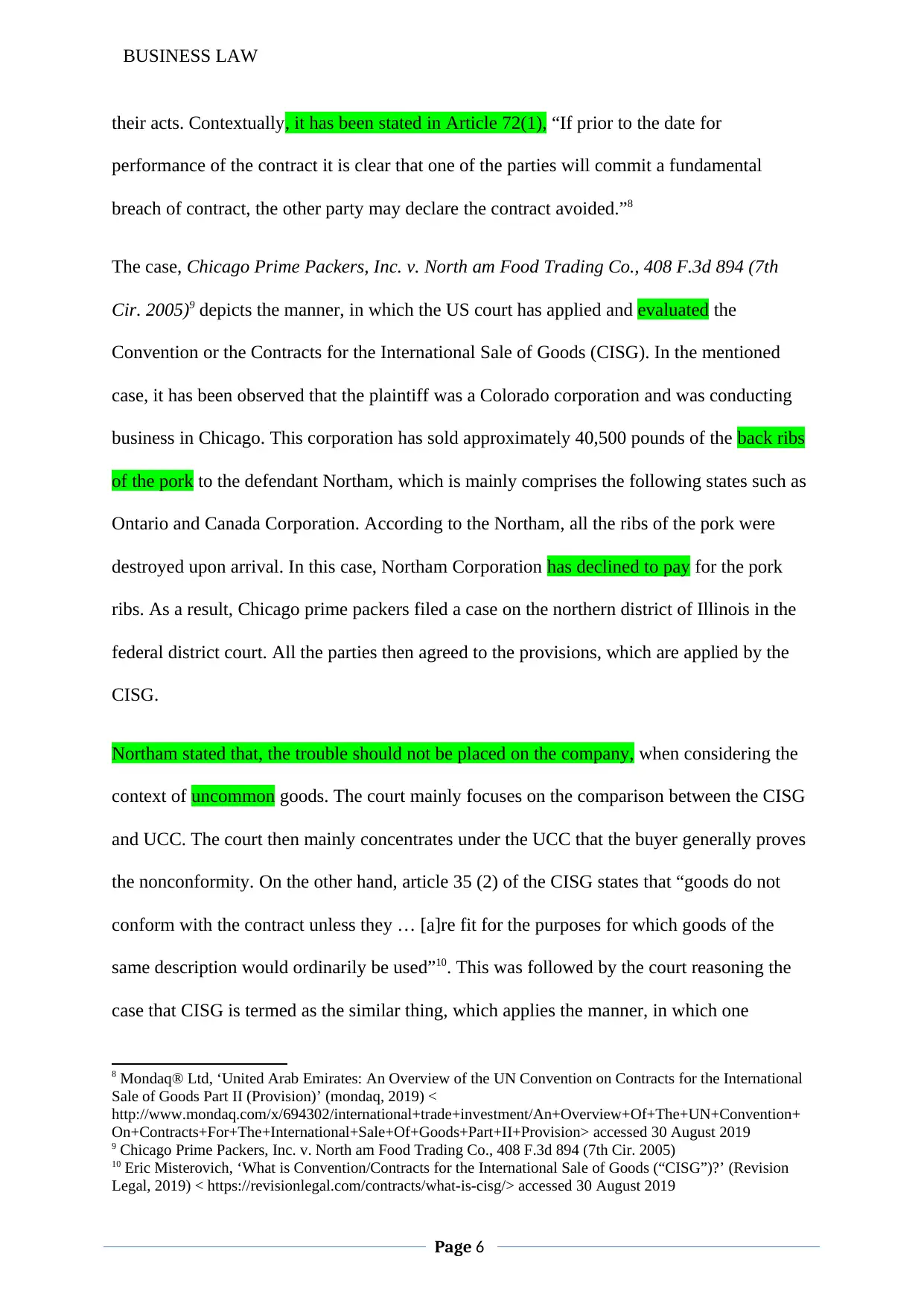
BUSINESS LAW
their acts. Contextually, it has been stated in Article 72(1), “If prior to the date for
performance of the contract it is clear that one of the parties will commit a fundamental
breach of contract, the other party may declare the contract avoided.”8
The case, Chicago Prime Packers, Inc. v. North am Food Trading Co., 408 F.3d 894 (7th
Cir. 2005)9 depicts the manner, in which the US court has applied and evaluated the
Convention or the Contracts for the International Sale of Goods (CISG). In the mentioned
case, it has been observed that the plaintiff was a Colorado corporation and was conducting
business in Chicago. This corporation has sold approximately 40,500 pounds of the back ribs
of the pork to the defendant Northam, which is mainly comprises the following states such as
Ontario and Canada Corporation. According to the Northam, all the ribs of the pork were
destroyed upon arrival. In this case, Northam Corporation has declined to pay for the pork
ribs. As a result, Chicago prime packers filed a case on the northern district of Illinois in the
federal district court. All the parties then agreed to the provisions, which are applied by the
CISG.
Northam stated that, the trouble should not be placed on the company, when considering the
context of uncommon goods. The court mainly focuses on the comparison between the CISG
and UCC. The court then mainly concentrates under the UCC that the buyer generally proves
the nonconformity. On the other hand, article 35 (2) of the CISG states that “goods do not
conform with the contract unless they … [a]re fit for the purposes for which goods of the
same description would ordinarily be used”10. This was followed by the court reasoning the
case that CISG is termed as the similar thing, which applies the manner, in which one
8 Mondaq® Ltd, ‘United Arab Emirates: An Overview of the UN Convention on Contracts for the International
Sale of Goods Part II (Provision)’ (mondaq, 2019) <
http://www.mondaq.com/x/694302/international+trade+investment/An+Overview+Of+The+UN+Convention+
On+Contracts+For+The+International+Sale+Of+Goods+Part+II+Provision> accessed 30 August 2019
9 Chicago Prime Packers, Inc. v. North am Food Trading Co., 408 F.3d 894 (7th Cir. 2005)
10 Eric Misterovich, ‘What is Convention/Contracts for the International Sale of Goods (“CISG”)?’ (Revision
Legal, 2019) < https://revisionlegal.com/contracts/what-is-cisg/> accessed 30 August 2019
Page 6
their acts. Contextually, it has been stated in Article 72(1), “If prior to the date for
performance of the contract it is clear that one of the parties will commit a fundamental
breach of contract, the other party may declare the contract avoided.”8
The case, Chicago Prime Packers, Inc. v. North am Food Trading Co., 408 F.3d 894 (7th
Cir. 2005)9 depicts the manner, in which the US court has applied and evaluated the
Convention or the Contracts for the International Sale of Goods (CISG). In the mentioned
case, it has been observed that the plaintiff was a Colorado corporation and was conducting
business in Chicago. This corporation has sold approximately 40,500 pounds of the back ribs
of the pork to the defendant Northam, which is mainly comprises the following states such as
Ontario and Canada Corporation. According to the Northam, all the ribs of the pork were
destroyed upon arrival. In this case, Northam Corporation has declined to pay for the pork
ribs. As a result, Chicago prime packers filed a case on the northern district of Illinois in the
federal district court. All the parties then agreed to the provisions, which are applied by the
CISG.
Northam stated that, the trouble should not be placed on the company, when considering the
context of uncommon goods. The court mainly focuses on the comparison between the CISG
and UCC. The court then mainly concentrates under the UCC that the buyer generally proves
the nonconformity. On the other hand, article 35 (2) of the CISG states that “goods do not
conform with the contract unless they … [a]re fit for the purposes for which goods of the
same description would ordinarily be used”10. This was followed by the court reasoning the
case that CISG is termed as the similar thing, which applies the manner, in which one
8 Mondaq® Ltd, ‘United Arab Emirates: An Overview of the UN Convention on Contracts for the International
Sale of Goods Part II (Provision)’ (mondaq, 2019) <
http://www.mondaq.com/x/694302/international+trade+investment/An+Overview+Of+The+UN+Convention+
On+Contracts+For+The+International+Sale+Of+Goods+Part+II+Provision> accessed 30 August 2019
9 Chicago Prime Packers, Inc. v. North am Food Trading Co., 408 F.3d 894 (7th Cir. 2005)
10 Eric Misterovich, ‘What is Convention/Contracts for the International Sale of Goods (“CISG”)?’ (Revision
Legal, 2019) < https://revisionlegal.com/contracts/what-is-cisg/> accessed 30 August 2019
Page 6
⊘ This is a preview!⊘
Do you want full access?
Subscribe today to unlock all pages.

Trusted by 1+ million students worldwide
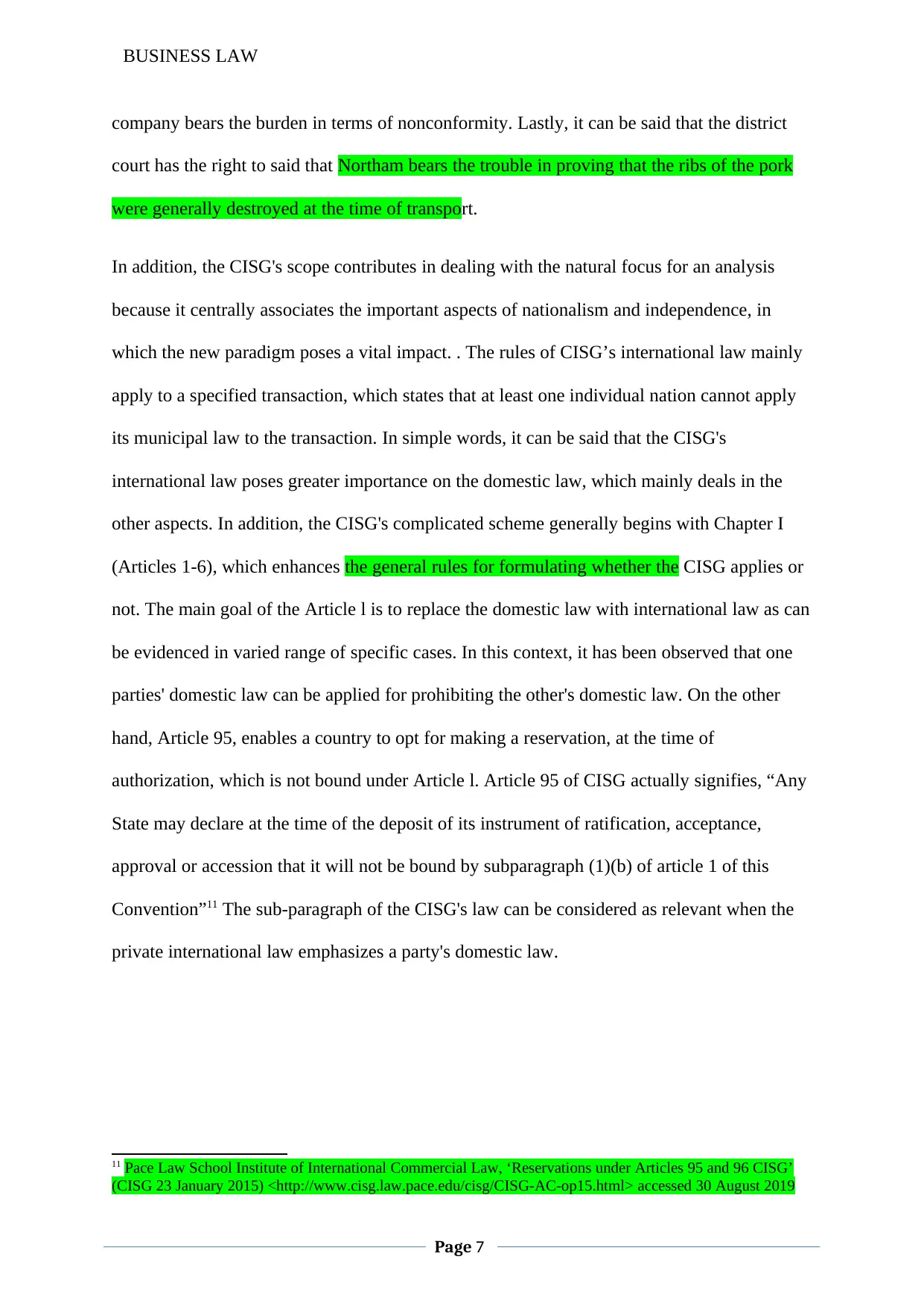
BUSINESS LAW
company bears the burden in terms of nonconformity. Lastly, it can be said that the district
court has the right to said that Northam bears the trouble in proving that the ribs of the pork
were generally destroyed at the time of transport.
In addition, the CISG's scope contributes in dealing with the natural focus for an analysis
because it centrally associates the important aspects of nationalism and independence, in
which the new paradigm poses a vital impact. . The rules of CISG’s international law mainly
apply to a specified transaction, which states that at least one individual nation cannot apply
its municipal law to the transaction. In simple words, it can be said that the CISG's
international law poses greater importance on the domestic law, which mainly deals in the
other aspects. In addition, the CISG's complicated scheme generally begins with Chapter I
(Articles 1-6), which enhances the general rules for formulating whether the CISG applies or
not. The main goal of the Article l is to replace the domestic law with international law as can
be evidenced in varied range of specific cases. In this context, it has been observed that one
parties' domestic law can be applied for prohibiting the other's domestic law. On the other
hand, Article 95, enables a country to opt for making a reservation, at the time of
authorization, which is not bound under Article l. Article 95 of CISG actually signifies, “Any
State may declare at the time of the deposit of its instrument of ratification, acceptance,
approval or accession that it will not be bound by subparagraph (1)(b) of article 1 of this
Convention”11 The sub-paragraph of the CISG's law can be considered as relevant when the
private international law emphasizes a party's domestic law.
11 Pace Law School Institute of International Commercial Law, ‘Reservations under Articles 95 and 96 CISG’
(CISG 23 January 2015) <http://www.cisg.law.pace.edu/cisg/CISG-AC-op15.html> accessed 30 August 2019
Page 7
company bears the burden in terms of nonconformity. Lastly, it can be said that the district
court has the right to said that Northam bears the trouble in proving that the ribs of the pork
were generally destroyed at the time of transport.
In addition, the CISG's scope contributes in dealing with the natural focus for an analysis
because it centrally associates the important aspects of nationalism and independence, in
which the new paradigm poses a vital impact. . The rules of CISG’s international law mainly
apply to a specified transaction, which states that at least one individual nation cannot apply
its municipal law to the transaction. In simple words, it can be said that the CISG's
international law poses greater importance on the domestic law, which mainly deals in the
other aspects. In addition, the CISG's complicated scheme generally begins with Chapter I
(Articles 1-6), which enhances the general rules for formulating whether the CISG applies or
not. The main goal of the Article l is to replace the domestic law with international law as can
be evidenced in varied range of specific cases. In this context, it has been observed that one
parties' domestic law can be applied for prohibiting the other's domestic law. On the other
hand, Article 95, enables a country to opt for making a reservation, at the time of
authorization, which is not bound under Article l. Article 95 of CISG actually signifies, “Any
State may declare at the time of the deposit of its instrument of ratification, acceptance,
approval or accession that it will not be bound by subparagraph (1)(b) of article 1 of this
Convention”11 The sub-paragraph of the CISG's law can be considered as relevant when the
private international law emphasizes a party's domestic law.
11 Pace Law School Institute of International Commercial Law, ‘Reservations under Articles 95 and 96 CISG’
(CISG 23 January 2015) <http://www.cisg.law.pace.edu/cisg/CISG-AC-op15.html> accessed 30 August 2019
Page 7
Paraphrase This Document
Need a fresh take? Get an instant paraphrase of this document with our AI Paraphraser
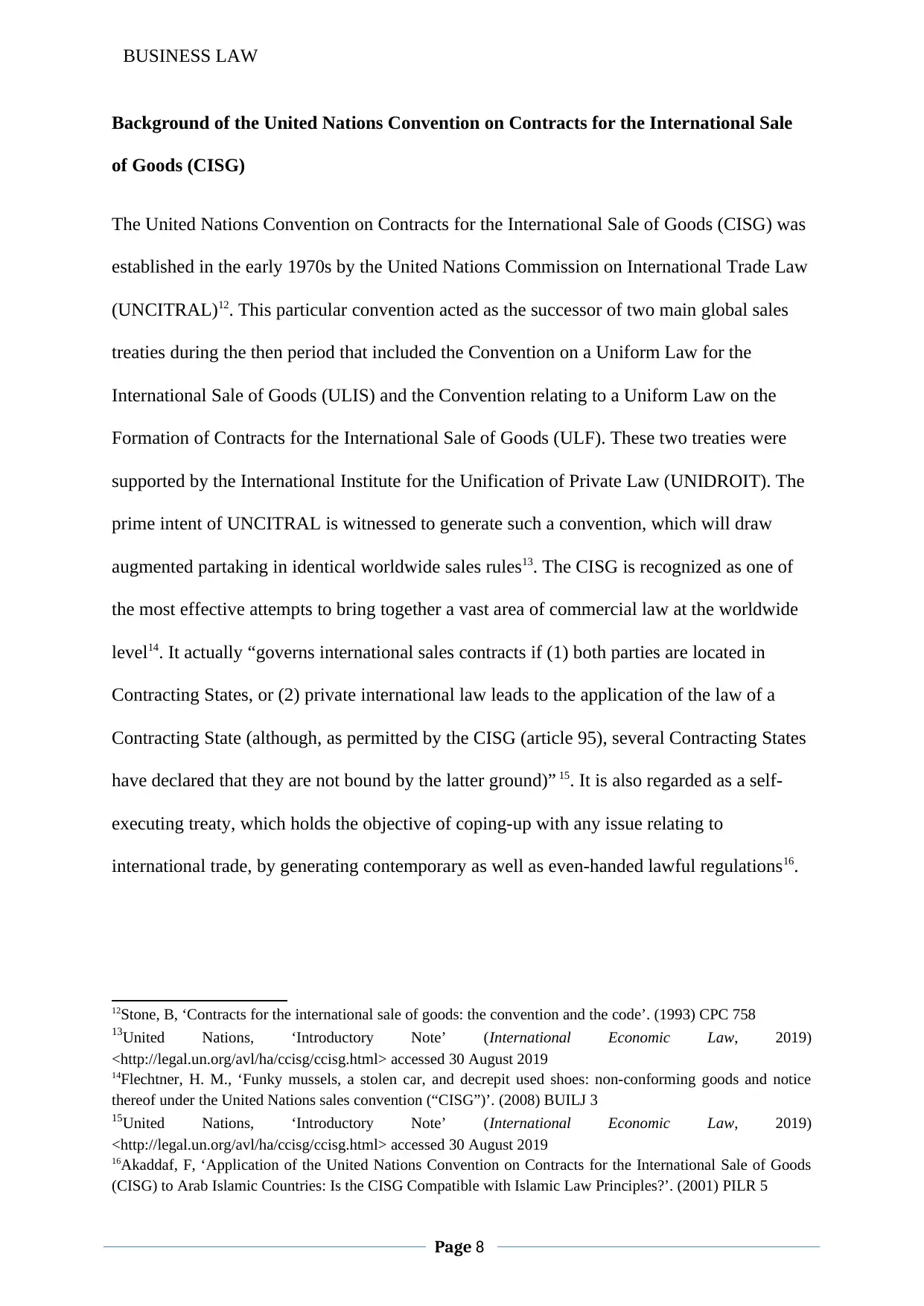
BUSINESS LAW
Background of the United Nations Convention on Contracts for the International Sale
of Goods (CISG)
The United Nations Convention on Contracts for the International Sale of Goods (CISG) was
established in the early 1970s by the United Nations Commission on International Trade Law
(UNCITRAL)12. This particular convention acted as the successor of two main global sales
treaties during the then period that included the Convention on a Uniform Law for the
International Sale of Goods (ULIS) and the Convention relating to a Uniform Law on the
Formation of Contracts for the International Sale of Goods (ULF). These two treaties were
supported by the International Institute for the Unification of Private Law (UNIDROIT). The
prime intent of UNCITRAL is witnessed to generate such a convention, which will draw
augmented partaking in identical worldwide sales rules13. The CISG is recognized as one of
the most effective attempts to bring together a vast area of commercial law at the worldwide
level14. It actually “governs international sales contracts if (1) both parties are located in
Contracting States, or (2) private international law leads to the application of the law of a
Contracting State (although, as permitted by the CISG (article 95), several Contracting States
have declared that they are not bound by the latter ground)” 15. It is also regarded as a self-
executing treaty, which holds the objective of coping-up with any issue relating to
international trade, by generating contemporary as well as even-handed lawful regulations16.
12Stone, B, ‘Contracts for the international sale of goods: the convention and the code’. (1993) CPC 758
13United Nations, ‘Introductory Note’ (International Economic Law, 2019)
<http://legal.un.org/avl/ha/ccisg/ccisg.html> accessed 30 August 2019
14Flechtner, H. M., ‘Funky mussels, a stolen car, and decrepit used shoes: non-conforming goods and notice
thereof under the United Nations sales convention (“CISG”)’. (2008) BUILJ 3
15United Nations, ‘Introductory Note’ (International Economic Law, 2019)
<http://legal.un.org/avl/ha/ccisg/ccisg.html> accessed 30 August 2019
16Akaddaf, F, ‘Application of the United Nations Convention on Contracts for the International Sale of Goods
(CISG) to Arab Islamic Countries: Is the CISG Compatible with Islamic Law Principles?’. (2001) PILR 5
Page 8
Background of the United Nations Convention on Contracts for the International Sale
of Goods (CISG)
The United Nations Convention on Contracts for the International Sale of Goods (CISG) was
established in the early 1970s by the United Nations Commission on International Trade Law
(UNCITRAL)12. This particular convention acted as the successor of two main global sales
treaties during the then period that included the Convention on a Uniform Law for the
International Sale of Goods (ULIS) and the Convention relating to a Uniform Law on the
Formation of Contracts for the International Sale of Goods (ULF). These two treaties were
supported by the International Institute for the Unification of Private Law (UNIDROIT). The
prime intent of UNCITRAL is witnessed to generate such a convention, which will draw
augmented partaking in identical worldwide sales rules13. The CISG is recognized as one of
the most effective attempts to bring together a vast area of commercial law at the worldwide
level14. It actually “governs international sales contracts if (1) both parties are located in
Contracting States, or (2) private international law leads to the application of the law of a
Contracting State (although, as permitted by the CISG (article 95), several Contracting States
have declared that they are not bound by the latter ground)” 15. It is also regarded as a self-
executing treaty, which holds the objective of coping-up with any issue relating to
international trade, by generating contemporary as well as even-handed lawful regulations16.
12Stone, B, ‘Contracts for the international sale of goods: the convention and the code’. (1993) CPC 758
13United Nations, ‘Introductory Note’ (International Economic Law, 2019)
<http://legal.un.org/avl/ha/ccisg/ccisg.html> accessed 30 August 2019
14Flechtner, H. M., ‘Funky mussels, a stolen car, and decrepit used shoes: non-conforming goods and notice
thereof under the United Nations sales convention (“CISG”)’. (2008) BUILJ 3
15United Nations, ‘Introductory Note’ (International Economic Law, 2019)
<http://legal.un.org/avl/ha/ccisg/ccisg.html> accessed 30 August 2019
16Akaddaf, F, ‘Application of the United Nations Convention on Contracts for the International Sale of Goods
(CISG) to Arab Islamic Countries: Is the CISG Compatible with Islamic Law Principles?’. (2001) PILR 5
Page 8
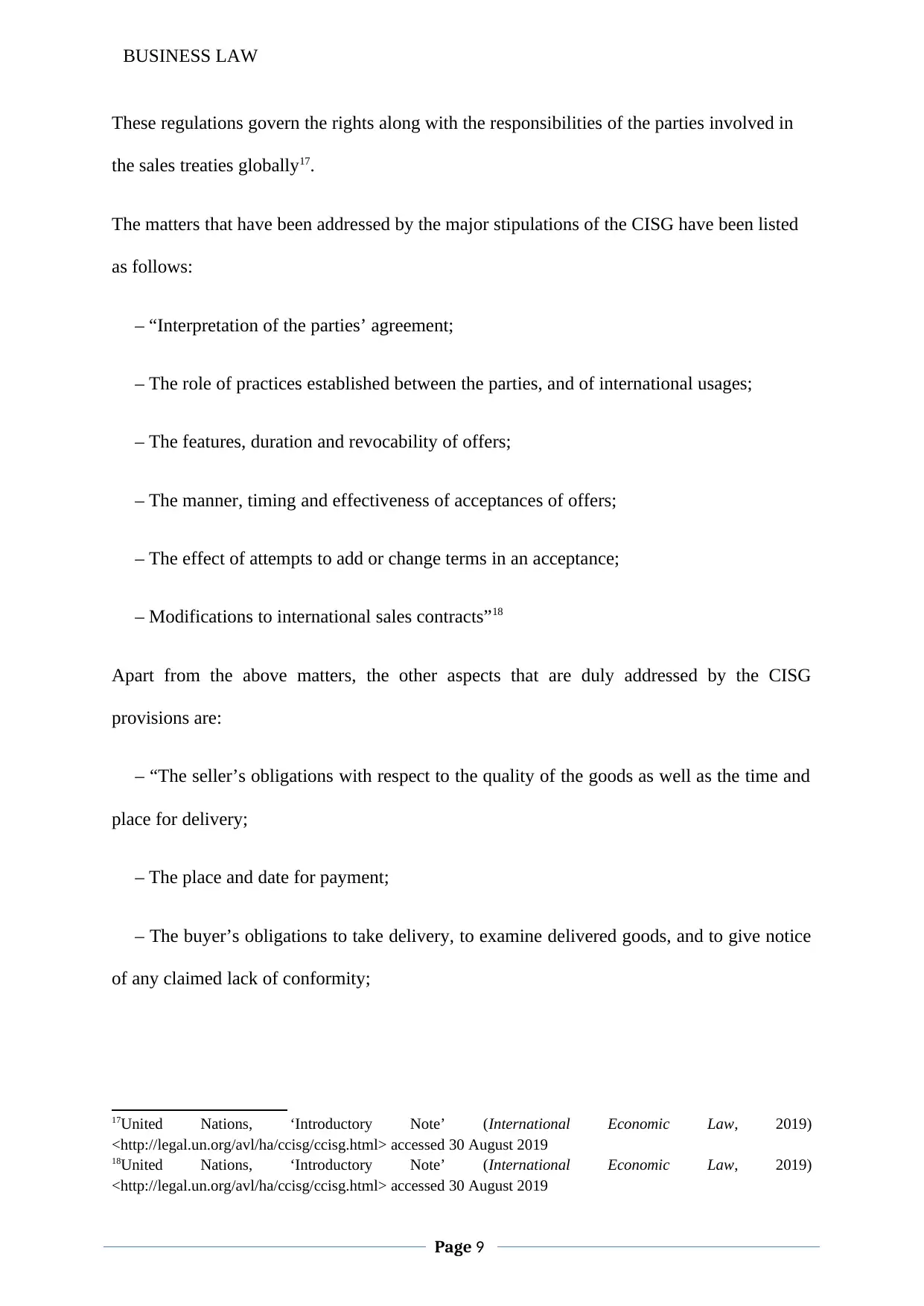
BUSINESS LAW
These regulations govern the rights along with the responsibilities of the parties involved in
the sales treaties globally17.
The matters that have been addressed by the major stipulations of the CISG have been listed
as follows:
– “Interpretation of the parties’ agreement;
– The role of practices established between the parties, and of international usages;
– The features, duration and revocability of offers;
– The manner, timing and effectiveness of acceptances of offers;
– The effect of attempts to add or change terms in an acceptance;
– Modifications to international sales contracts”18
Apart from the above matters, the other aspects that are duly addressed by the CISG
provisions are:
– “The seller’s obligations with respect to the quality of the goods as well as the time and
place for delivery;
– The place and date for payment;
– The buyer’s obligations to take delivery, to examine delivered goods, and to give notice
of any claimed lack of conformity;
17United Nations, ‘Introductory Note’ (International Economic Law, 2019)
<http://legal.un.org/avl/ha/ccisg/ccisg.html> accessed 30 August 2019
18United Nations, ‘Introductory Note’ (International Economic Law, 2019)
<http://legal.un.org/avl/ha/ccisg/ccisg.html> accessed 30 August 2019
Page 9
These regulations govern the rights along with the responsibilities of the parties involved in
the sales treaties globally17.
The matters that have been addressed by the major stipulations of the CISG have been listed
as follows:
– “Interpretation of the parties’ agreement;
– The role of practices established between the parties, and of international usages;
– The features, duration and revocability of offers;
– The manner, timing and effectiveness of acceptances of offers;
– The effect of attempts to add or change terms in an acceptance;
– Modifications to international sales contracts”18
Apart from the above matters, the other aspects that are duly addressed by the CISG
provisions are:
– “The seller’s obligations with respect to the quality of the goods as well as the time and
place for delivery;
– The place and date for payment;
– The buyer’s obligations to take delivery, to examine delivered goods, and to give notice
of any claimed lack of conformity;
17United Nations, ‘Introductory Note’ (International Economic Law, 2019)
<http://legal.un.org/avl/ha/ccisg/ccisg.html> accessed 30 August 2019
18United Nations, ‘Introductory Note’ (International Economic Law, 2019)
<http://legal.un.org/avl/ha/ccisg/ccisg.html> accessed 30 August 2019
Page 9
⊘ This is a preview!⊘
Do you want full access?
Subscribe today to unlock all pages.

Trusted by 1+ million students worldwide
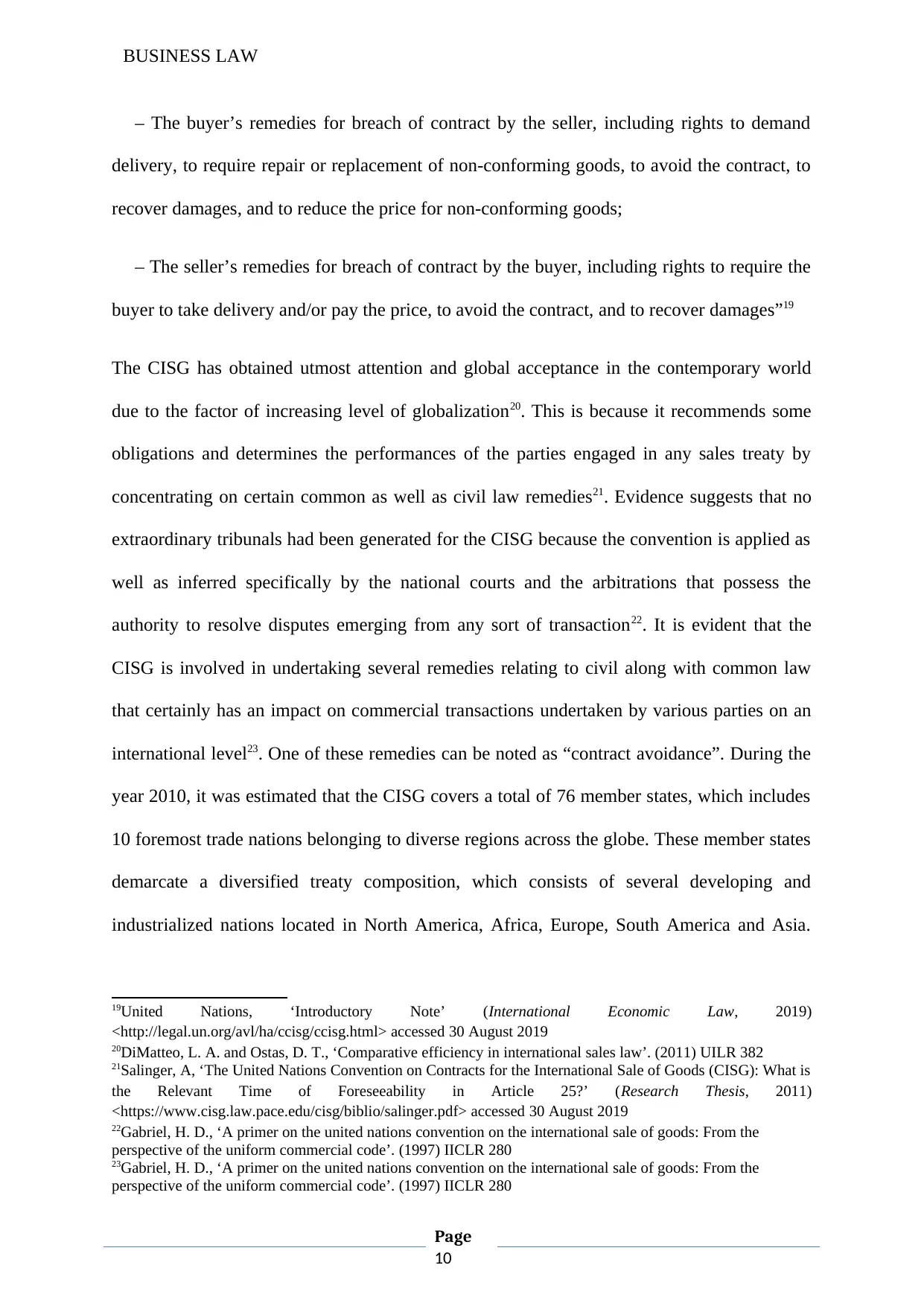
BUSINESS LAW
– The buyer’s remedies for breach of contract by the seller, including rights to demand
delivery, to require repair or replacement of non-conforming goods, to avoid the contract, to
recover damages, and to reduce the price for non-conforming goods;
– The seller’s remedies for breach of contract by the buyer, including rights to require the
buyer to take delivery and/or pay the price, to avoid the contract, and to recover damages”19
The CISG has obtained utmost attention and global acceptance in the contemporary world
due to the factor of increasing level of globalization20. This is because it recommends some
obligations and determines the performances of the parties engaged in any sales treaty by
concentrating on certain common as well as civil law remedies21. Evidence suggests that no
extraordinary tribunals had been generated for the CISG because the convention is applied as
well as inferred specifically by the national courts and the arbitrations that possess the
authority to resolve disputes emerging from any sort of transaction22. It is evident that the
CISG is involved in undertaking several remedies relating to civil along with common law
that certainly has an impact on commercial transactions undertaken by various parties on an
international level23. One of these remedies can be noted as “contract avoidance”. During the
year 2010, it was estimated that the CISG covers a total of 76 member states, which includes
10 foremost trade nations belonging to diverse regions across the globe. These member states
demarcate a diversified treaty composition, which consists of several developing and
industrialized nations located in North America, Africa, Europe, South America and Asia.
19United Nations, ‘Introductory Note’ (International Economic Law, 2019)
<http://legal.un.org/avl/ha/ccisg/ccisg.html> accessed 30 August 2019
20DiMatteo, L. A. and Ostas, D. T., ‘Comparative efficiency in international sales law’. (2011) UILR 382
21Salinger, A, ‘The United Nations Convention on Contracts for the International Sale of Goods (CISG): What is
the Relevant Time of Foreseeability in Article 25?’ (Research Thesis, 2011)
<https://www.cisg.law.pace.edu/cisg/biblio/salinger.pdf> accessed 30 August 2019
22Gabriel, H. D., ‘A primer on the united nations convention on the international sale of goods: From the
perspective of the uniform commercial code’. (1997) IICLR 280
23Gabriel, H. D., ‘A primer on the united nations convention on the international sale of goods: From the
perspective of the uniform commercial code’. (1997) IICLR 280
Page
10
– The buyer’s remedies for breach of contract by the seller, including rights to demand
delivery, to require repair or replacement of non-conforming goods, to avoid the contract, to
recover damages, and to reduce the price for non-conforming goods;
– The seller’s remedies for breach of contract by the buyer, including rights to require the
buyer to take delivery and/or pay the price, to avoid the contract, and to recover damages”19
The CISG has obtained utmost attention and global acceptance in the contemporary world
due to the factor of increasing level of globalization20. This is because it recommends some
obligations and determines the performances of the parties engaged in any sales treaty by
concentrating on certain common as well as civil law remedies21. Evidence suggests that no
extraordinary tribunals had been generated for the CISG because the convention is applied as
well as inferred specifically by the national courts and the arbitrations that possess the
authority to resolve disputes emerging from any sort of transaction22. It is evident that the
CISG is involved in undertaking several remedies relating to civil along with common law
that certainly has an impact on commercial transactions undertaken by various parties on an
international level23. One of these remedies can be noted as “contract avoidance”. During the
year 2010, it was estimated that the CISG covers a total of 76 member states, which includes
10 foremost trade nations belonging to diverse regions across the globe. These member states
demarcate a diversified treaty composition, which consists of several developing and
industrialized nations located in North America, Africa, Europe, South America and Asia.
19United Nations, ‘Introductory Note’ (International Economic Law, 2019)
<http://legal.un.org/avl/ha/ccisg/ccisg.html> accessed 30 August 2019
20DiMatteo, L. A. and Ostas, D. T., ‘Comparative efficiency in international sales law’. (2011) UILR 382
21Salinger, A, ‘The United Nations Convention on Contracts for the International Sale of Goods (CISG): What is
the Relevant Time of Foreseeability in Article 25?’ (Research Thesis, 2011)
<https://www.cisg.law.pace.edu/cisg/biblio/salinger.pdf> accessed 30 August 2019
22Gabriel, H. D., ‘A primer on the united nations convention on the international sale of goods: From the
perspective of the uniform commercial code’. (1997) IICLR 280
23Gabriel, H. D., ‘A primer on the united nations convention on the international sale of goods: From the
perspective of the uniform commercial code’. (1997) IICLR 280
Page
10
Paraphrase This Document
Need a fresh take? Get an instant paraphrase of this document with our AI Paraphraser
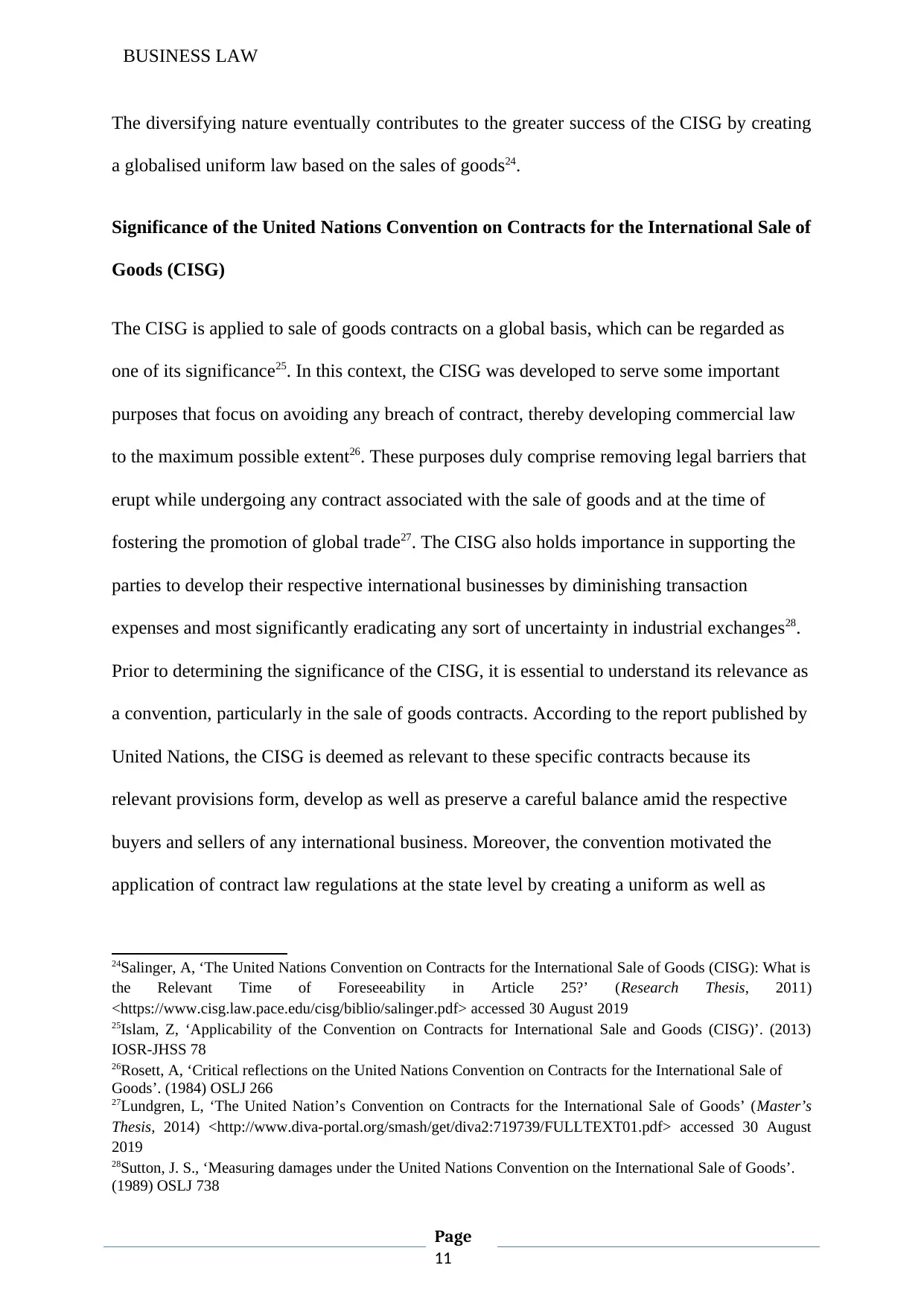
BUSINESS LAW
The diversifying nature eventually contributes to the greater success of the CISG by creating
a globalised uniform law based on the sales of goods24.
Significance of the United Nations Convention on Contracts for the International Sale of
Goods (CISG)
The CISG is applied to sale of goods contracts on a global basis, which can be regarded as
one of its significance25. In this context, the CISG was developed to serve some important
purposes that focus on avoiding any breach of contract, thereby developing commercial law
to the maximum possible extent26. These purposes duly comprise removing legal barriers that
erupt while undergoing any contract associated with the sale of goods and at the time of
fostering the promotion of global trade27. The CISG also holds importance in supporting the
parties to develop their respective international businesses by diminishing transaction
expenses and most significantly eradicating any sort of uncertainty in industrial exchanges28.
Prior to determining the significance of the CISG, it is essential to understand its relevance as
a convention, particularly in the sale of goods contracts. According to the report published by
United Nations, the CISG is deemed as relevant to these specific contracts because its
relevant provisions form, develop as well as preserve a careful balance amid the respective
buyers and sellers of any international business. Moreover, the convention motivated the
application of contract law regulations at the state level by creating a uniform as well as
24Salinger, A, ‘The United Nations Convention on Contracts for the International Sale of Goods (CISG): What is
the Relevant Time of Foreseeability in Article 25?’ (Research Thesis, 2011)
<https://www.cisg.law.pace.edu/cisg/biblio/salinger.pdf> accessed 30 August 2019
25Islam, Z, ‘Applicability of the Convention on Contracts for International Sale and Goods (CISG)’. (2013)
IOSR-JHSS 78
26Rosett, A, ‘Critical reflections on the United Nations Convention on Contracts for the International Sale of
Goods’. (1984) OSLJ 266
27Lundgren, L, ‘The United Nation’s Convention on Contracts for the International Sale of Goods’ (Master’s
Thesis, 2014) <http://www.diva-portal.org/smash/get/diva2:719739/FULLTEXT01.pdf> accessed 30 August
2019
28Sutton, J. S., ‘Measuring damages under the United Nations Convention on the International Sale of Goods’.
(1989) OSLJ 738
Page
11
The diversifying nature eventually contributes to the greater success of the CISG by creating
a globalised uniform law based on the sales of goods24.
Significance of the United Nations Convention on Contracts for the International Sale of
Goods (CISG)
The CISG is applied to sale of goods contracts on a global basis, which can be regarded as
one of its significance25. In this context, the CISG was developed to serve some important
purposes that focus on avoiding any breach of contract, thereby developing commercial law
to the maximum possible extent26. These purposes duly comprise removing legal barriers that
erupt while undergoing any contract associated with the sale of goods and at the time of
fostering the promotion of global trade27. The CISG also holds importance in supporting the
parties to develop their respective international businesses by diminishing transaction
expenses and most significantly eradicating any sort of uncertainty in industrial exchanges28.
Prior to determining the significance of the CISG, it is essential to understand its relevance as
a convention, particularly in the sale of goods contracts. According to the report published by
United Nations, the CISG is deemed as relevant to these specific contracts because its
relevant provisions form, develop as well as preserve a careful balance amid the respective
buyers and sellers of any international business. Moreover, the convention motivated the
application of contract law regulations at the state level by creating a uniform as well as
24Salinger, A, ‘The United Nations Convention on Contracts for the International Sale of Goods (CISG): What is
the Relevant Time of Foreseeability in Article 25?’ (Research Thesis, 2011)
<https://www.cisg.law.pace.edu/cisg/biblio/salinger.pdf> accessed 30 August 2019
25Islam, Z, ‘Applicability of the Convention on Contracts for International Sale and Goods (CISG)’. (2013)
IOSR-JHSS 78
26Rosett, A, ‘Critical reflections on the United Nations Convention on Contracts for the International Sale of
Goods’. (1984) OSLJ 266
27Lundgren, L, ‘The United Nation’s Convention on Contracts for the International Sale of Goods’ (Master’s
Thesis, 2014) <http://www.diva-portal.org/smash/get/diva2:719739/FULLTEXT01.pdf> accessed 30 August
2019
28Sutton, J. S., ‘Measuring damages under the United Nations Convention on the International Sale of Goods’.
(1989) OSLJ 738
Page
11
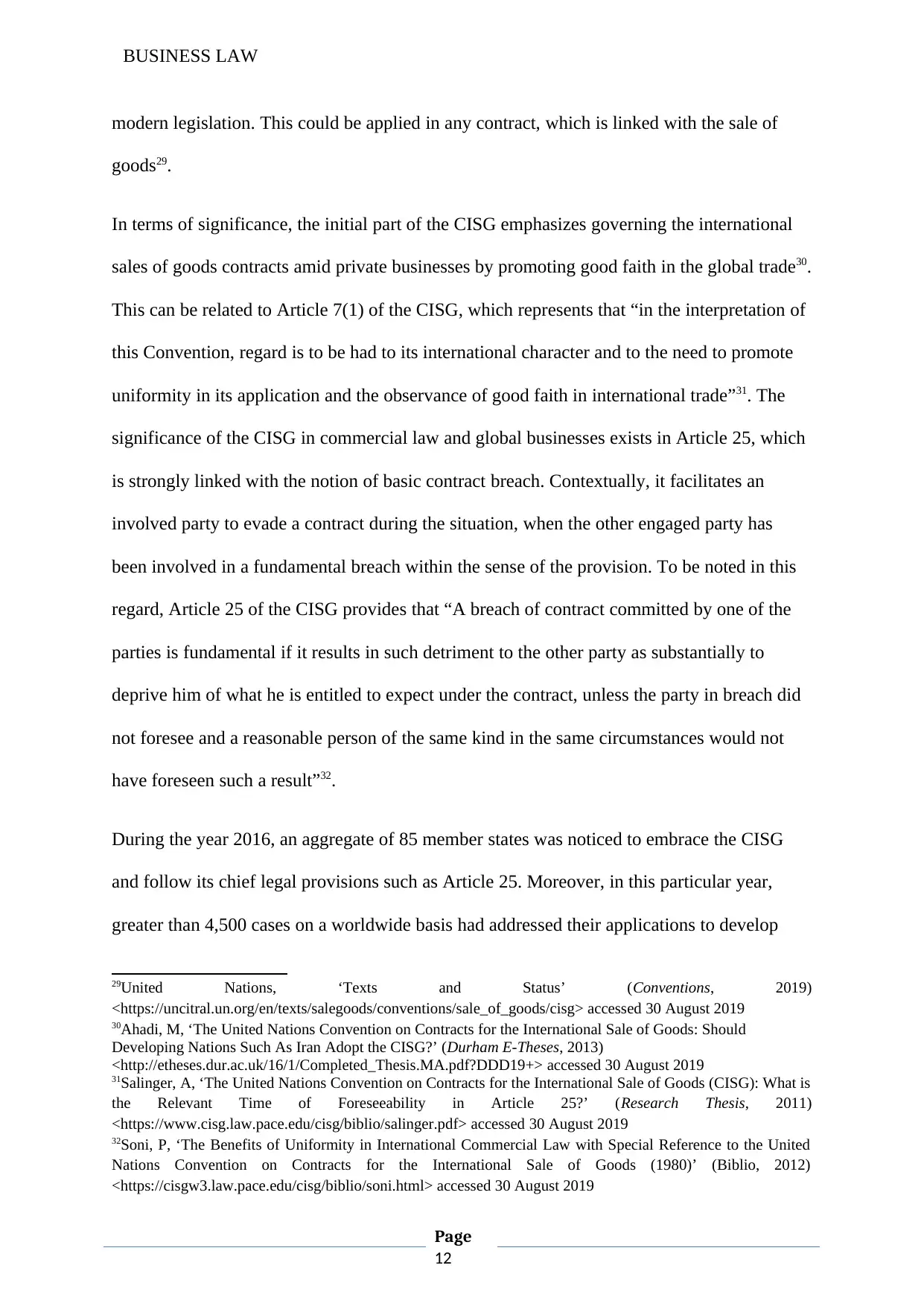
BUSINESS LAW
modern legislation. This could be applied in any contract, which is linked with the sale of
goods29.
In terms of significance, the initial part of the CISG emphasizes governing the international
sales of goods contracts amid private businesses by promoting good faith in the global trade30.
This can be related to Article 7(1) of the CISG, which represents that “in the interpretation of
this Convention, regard is to be had to its international character and to the need to promote
uniformity in its application and the observance of good faith in international trade”31. The
significance of the CISG in commercial law and global businesses exists in Article 25, which
is strongly linked with the notion of basic contract breach. Contextually, it facilitates an
involved party to evade a contract during the situation, when the other engaged party has
been involved in a fundamental breach within the sense of the provision. To be noted in this
regard, Article 25 of the CISG provides that “A breach of contract committed by one of the
parties is fundamental if it results in such detriment to the other party as substantially to
deprive him of what he is entitled to expect under the contract, unless the party in breach did
not foresee and a reasonable person of the same kind in the same circumstances would not
have foreseen such a result”32.
During the year 2016, an aggregate of 85 member states was noticed to embrace the CISG
and follow its chief legal provisions such as Article 25. Moreover, in this particular year,
greater than 4,500 cases on a worldwide basis had addressed their applications to develop
29United Nations, ‘Texts and Status’ (Conventions, 2019)
<https://uncitral.un.org/en/texts/salegoods/conventions/sale_of_goods/cisg> accessed 30 August 2019
30Ahadi, M, ‘The United Nations Convention on Contracts for the International Sale of Goods: Should
Developing Nations Such As Iran Adopt the CISG?’ (Durham E-Theses, 2013)
<http://etheses.dur.ac.uk/16/1/Completed_Thesis.MA.pdf?DDD19+> accessed 30 August 2019
31Salinger, A, ‘The United Nations Convention on Contracts for the International Sale of Goods (CISG): What is
the Relevant Time of Foreseeability in Article 25?’ (Research Thesis, 2011)
<https://www.cisg.law.pace.edu/cisg/biblio/salinger.pdf> accessed 30 August 2019
32Soni, P, ‘The Benefits of Uniformity in International Commercial Law with Special Reference to the United
Nations Convention on Contracts for the International Sale of Goods (1980)’ (Biblio, 2012)
<https://cisgw3.law.pace.edu/cisg/biblio/soni.html> accessed 30 August 2019
Page
12
modern legislation. This could be applied in any contract, which is linked with the sale of
goods29.
In terms of significance, the initial part of the CISG emphasizes governing the international
sales of goods contracts amid private businesses by promoting good faith in the global trade30.
This can be related to Article 7(1) of the CISG, which represents that “in the interpretation of
this Convention, regard is to be had to its international character and to the need to promote
uniformity in its application and the observance of good faith in international trade”31. The
significance of the CISG in commercial law and global businesses exists in Article 25, which
is strongly linked with the notion of basic contract breach. Contextually, it facilitates an
involved party to evade a contract during the situation, when the other engaged party has
been involved in a fundamental breach within the sense of the provision. To be noted in this
regard, Article 25 of the CISG provides that “A breach of contract committed by one of the
parties is fundamental if it results in such detriment to the other party as substantially to
deprive him of what he is entitled to expect under the contract, unless the party in breach did
not foresee and a reasonable person of the same kind in the same circumstances would not
have foreseen such a result”32.
During the year 2016, an aggregate of 85 member states was noticed to embrace the CISG
and follow its chief legal provisions such as Article 25. Moreover, in this particular year,
greater than 4,500 cases on a worldwide basis had addressed their applications to develop
29United Nations, ‘Texts and Status’ (Conventions, 2019)
<https://uncitral.un.org/en/texts/salegoods/conventions/sale_of_goods/cisg> accessed 30 August 2019
30Ahadi, M, ‘The United Nations Convention on Contracts for the International Sale of Goods: Should
Developing Nations Such As Iran Adopt the CISG?’ (Durham E-Theses, 2013)
<http://etheses.dur.ac.uk/16/1/Completed_Thesis.MA.pdf?DDD19+> accessed 30 August 2019
31Salinger, A, ‘The United Nations Convention on Contracts for the International Sale of Goods (CISG): What is
the Relevant Time of Foreseeability in Article 25?’ (Research Thesis, 2011)
<https://www.cisg.law.pace.edu/cisg/biblio/salinger.pdf> accessed 30 August 2019
32Soni, P, ‘The Benefits of Uniformity in International Commercial Law with Special Reference to the United
Nations Convention on Contracts for the International Sale of Goods (1980)’ (Biblio, 2012)
<https://cisgw3.law.pace.edu/cisg/biblio/soni.html> accessed 30 August 2019
Page
12
⊘ This is a preview!⊘
Do you want full access?
Subscribe today to unlock all pages.

Trusted by 1+ million students worldwide
1 out of 23
Related Documents
Your All-in-One AI-Powered Toolkit for Academic Success.
+13062052269
info@desklib.com
Available 24*7 on WhatsApp / Email
![[object Object]](/_next/static/media/star-bottom.7253800d.svg)
Unlock your academic potential
Copyright © 2020–2026 A2Z Services. All Rights Reserved. Developed and managed by ZUCOL.





